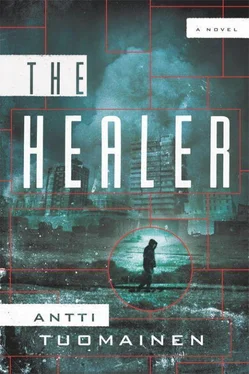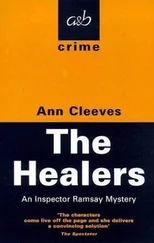I crossed the bridge between Eteläisen and Pohjoisen Rautatiekatu and looked down. Cars driven under the bridge and abandoned there now formed a row of small dwellings. The narrow passage under the bridge had been growing into its own neighborhood for several years. I could see smoke and steam rising, and smell grilling meat, gasoline—and moonshine, of course. The shouts of children could be heard here and there, playing a game, or shouting for other reasons.
I looked at my watch. It was almost ten. The minutes and hours seemed to pass more quickly as time went by. I reached Arkadiankatu, took out my telephone, and tried to call Johanna, with the same results as before. How many times would I try to call her? How many times would I listen to the toneless recorded voice of the woman telling me again and again what I knew only too well? I didn’t know. Maybe events had to be repeated until the repetition produced results, or until it was useless to try.
A tram full of people coming from downtown rattled past a couple of meters from me. The passengers standing near the door had their coats pressed up against the windows. Countless people on their way to work, on an ordinary day, getting on with their lives. The tram thudded to a stop and I continued walking, the cold wind, the smell of burned meat, and the angry stench of ethanol elbowing me in the back as I went.
I arrived at Ahti and Elina’s building, pressed the buzzer, and waited a moment. The camera moved under its hood like an insect’s antenna as it made its little circuit of the entrance. When it had assured itself that I wasn’t a threat, it stopped, the lock on the door opened, and I went inside. Although the elevator was waiting in the lobby, I took the stairs. My footsteps on the stone staircase rang like drumbeats in the quiet building.
The smell of a sickroom hit me as soon as I walked into the apartment. Elina’s face was small and pale in the electric light of the entryway. She nodded in greeting, turned, and walked into the living room. I pulled the door closed behind me, took off my coat and shoes, and followed her, pausing at the door to the bedroom to hear Ahti’s snores and see his feet under the covers at the foot of the bed. I was about to take a step into the room but decided against it.
Elina sat on the sofa with her feet tucked under her, her long hair lying all in a clump on her left shoulder. Once again the soft light gave the room a feeling that it had been forcibly frozen in time, an overly homey feeling. That was what bothered me about it. It felt like a fantasy, an attempt to return to the past.
I sat down in an imposing armchair that was covered in rough black fabric. It instantly warmed and relaxed my tired frame. I became aware of how exhausted and hungry I was, and of how little I felt like eating anything or making myself comfortable.
“Luckily he’s sleeping again,” Elina said. “Since he’s not really awake when he’s awake. He was so mixed up when he was talking just a while ago that it scared me.”
“I’m sorry Ahti’s sick. I’m sorry your trip’s been delayed.”
Elina gave a yelping laugh, but there was no joy in it. She took a breath, exhaled quickly, and lifted her left hand to her forehead, like she’d just remembered something.
“I’m sorry. I’m a little tired,” she said. “Tired of everything.”
“That’s all right,” I said. “It’s just a temporary setback. We’ll think of something.”
Elina didn’t say anything but glanced toward the bedroom and looked for a moment like she was listening very carefully to something that my ears, at least, couldn’t hear.
“Elina, we have to talk,” I said.
She looked at me again, her gaze sharper, colder.
“About Pasi Tarkiainen?”
I nodded. About Pasi Tarkiainen.
“What does he have to do with anything?” Elina asked. “With finding Johanna or anything else? It was all years ago, fifteen years or so. What does it matter?”
“I have a theory that Tarkiainen does have something to do with it.”
She stroked her hair with one hand and tugged at the hem of her sweater with the other.
“Johanna and Pasi lived together in Kivinokka, didn’t they?” I asked.
Elina nodded—not right away, but she nodded nevertheless.
“I find it hard to believe that digging up the past will help you find Johanna,” Elina said. “But go ahead. Do what you like.”
She sighed and tucked her feet tighter beneath her.
“We lived a different kind of life then,” she said. “We were young and naive. Students. We did everything together. Some things we shouldn’t have done.”
“Like what?”
“Like things Pasi thought of.” Elina glanced at me, saw the expression on my face, and laughed again. This laugh was noticeably more genuine than the previous one. “It’s not what you’re thinking. Pasi Tarkiainen was a radical environmentalist back then. That’s the kind of thing I’m talking about.”
“I see,” I said, and realized I was blushing.
“You’re jealous,” Elina said.
I nodded reluctantly, feeling heat in my cheeks.
“This all happened a long time ago. I’m sure you have a past, too.”
“Of course I do,” I said, feeling the heat spread to my neck and wanting to change the subject. “What were these ideas of Pasi’s?”
“He was a hard-line conservationist. He had contacts with the kinds of groups that were starting to shoot company owners and politicians—anyone who had caused environmental destruction or hadn’t done enough to slow it down. It was the black-and-white thinking of youth: if you’re not with us, you’re against us, and you don’t deserve to live. Johanna and I waved that flag, too. In secret, that is. But we believed it.”
“I didn’t know you were so radical,” I said. “I mean, I knew that Johanna was an activist, but I didn’t know that she’d been living with a terrorist.”
Elina looked for a moment like she was trying to remember how things really were. The coolness was disappearing from her gaze little by little.
“Pasi wasn’t a terrorist. A passionate person, even an obsessive person, yes, but he wasn’t a bad person. He hasn’t done anything wrong, has he?”
I thought of the murdered families and the evidence that Tarkiainen was at the scenes of those crimes. I shrugged and let the question pass.
“Why is it so hard for you to talk about?” I asked.
Elina nodded toward the bedroom.
“Ahti doesn’t really understand,” she said, then added faintly, almost involuntarily, “for a lot of reasons.”
I looked at her.
“Haven’t the two of you ever talked about it?” I asked.
She looked surprised and offended for a moment, then just surprised.
“Why would we? You and Johanna didn’t.”
The truth stung.
“No, we didn’t. I guess there wasn’t any reason to.”
“You were happy as long as you thought you knew everything you needed to know,” Elina said. “And now that you know that there were things you didn’t know, you feel bad. You’ve got to make up your mind about how much you really want to know. Even about your own wife.”
There was something in her voice that I’d never noticed before. The coolness had returned, and with it something hard, even bitter.
“Tell me more about Pasi Tarkiainen,” I said.
“Why?”
I looked her in the eye.
“You haven’t told me everything.”
She let out a puff of air and rolled her eyes. But she was a bad actor. Even she knew it.
“You’re not going to find Johanna by digging up things that happened a hundred years ago.”
“You haven’t told me everything,” I said again. “Ahti’s asleep. You can tell me.”
She glanced toward the bedroom again. We listened to the silence for a moment. I could hear Ahti snoring.
Читать дальше












